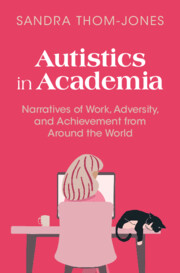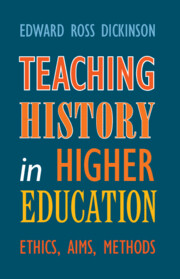Refine search
Actions for selected content:
112 results
Adam Smith the Dissenter
-
- Journal:
- Social Philosophy and Policy / Volume 42 / Issue 2 / Winter 2025
- Published online by Cambridge University Press:
- 16 December 2025, pp. 237-249
- Print publication:
- Winter 2025
-
- Article
-
- You have access
- Open access
- HTML
- Export citation
20 - Journalism and Academia
- from Part V - Identifying Performers of the Press Function
-
-
- Book:
- The Future of Press Freedom
- Published online:
- 25 July 2025
- Print publication:
- 24 July 2025, pp 325-345
-
- Chapter
-
- You have access
- Open access
- HTML
- Export citation
Introduction
-
-
- Book:
- Sean O'Casey in Context
- Published online:
- 23 June 2025
- Print publication:
- 10 July 2025, pp 1-6
-
- Chapter
- Export citation
Chapter 15 - Comics Go to School
- from Part III - Emerging Media
-
-
- Book:
- Latinx Literature in Transition, 1992–2020
- Published online:
- 19 June 2025
- Print publication:
- 03 July 2025, pp 279-294
-
- Chapter
- Export citation
Physical Education Teacher Education Students’ Perceptions of Competencies for Sustainable Development in Their Degree Program
-
- Journal:
- Australian Journal of Environmental Education / Volume 41 / Issue 4 / September 2025
- Published online by Cambridge University Press:
- 20 June 2025, pp. 873-888
-
- Article
-
- You have access
- Open access
- HTML
- Export citation
Chapter 1 - What is it to become a teacher?
- from Part 1 - Introduction to education
-
-
- Book:
- Introduction to Education
- Published online:
- 14 June 2025
- Print publication:
- 02 June 2025, pp 2-26
-
- Chapter
- Export citation
Evaluating University and Surrounding Area Factors Causing Variability in COVID-19 Vaccine Rates Among United States Universities
-
- Journal:
- Disaster Medicine and Public Health Preparedness / Volume 19 / 2025
- Published online by Cambridge University Press:
- 23 April 2025, e101
-
- Article
-
- You have access
- Open access
- HTML
- Export citation
Chapter 1 - Who Are We?
-
- Book:
- Autistics in Academia
- Published online:
- 06 March 2025
- Print publication:
- 13 March 2025, pp 1-14
-
- Chapter
- Export citation
Chapter 3 - Apprenticeship
-
- Book:
- Autistics in Academia
- Published online:
- 06 March 2025
- Print publication:
- 13 March 2025, pp 26-42
-
- Chapter
- Export citation

Autistics in Academia
- Narratives of Work, Adversity, and Achievement from Around the World
-
- Published online:
- 06 March 2025
- Print publication:
- 13 March 2025
Climate change professionals’ perspectives on the competencies for One Health graduates
-
- Journal:
- Research Directions: One Health / Volume 3 / 2025
- Published online by Cambridge University Press:
- 10 February 2025, e1
-
- Article
-
- You have access
- Open access
- HTML
- Export citation
Exploring Plogging’s Usefulness and Feasibility in Schools: Insights from Physical Education Teacher Education Students
-
- Journal:
- Australian Journal of Environmental Education / Volume 41 / Issue 1 / March 2025
- Published online by Cambridge University Press:
- 10 February 2025, pp. 74-90
-
- Article
-
- You have access
- Open access
- HTML
- Export citation

Teaching History in Higher Education
- Ethics, Aims, Methods
-
- Published online:
- 07 February 2025
- Print publication:
- 20 February 2025
Chapter 1 - The Independently Wealthy Gentleman
-
- Book:
- Schopenhauer's Politics
- Published online:
- 09 January 2025
- Print publication:
- 23 January 2025, pp 23-70
-
- Chapter
-
- You have access
- Open access
- HTML
- Export citation
Food consumption associated with depression, anxiety and stress in students entering a public university
-
- Journal:
- Journal of Nutritional Science / Volume 14 / 2025
- Published online by Cambridge University Press:
- 09 January 2025, e3
-
- Article
-
- You have access
- Open access
- HTML
- Export citation
Analytic theology and the academic study of religion: response to critics
-
- Journal:
- Religious Studies / Volume 61 / Issue 1 / March 2025
- Published online by Cambridge University Press:
- 18 November 2024, pp. 245-255
- Print publication:
- March 2025
-
- Article
- Export citation
Barriers and facilitators influencing the choice of a vegetarian menu in a university cafeteria
-
- Journal:
- Journal of Nutritional Science / Volume 13 / 2024
- Published online by Cambridge University Press:
- 18 November 2024, e71
-
- Article
-
- You have access
- Open access
- HTML
- Export citation
Analytic theology and the academic study of religion: an overview
-
- Journal:
- Religious Studies / Volume 61 / Issue 1 / March 2025
- Published online by Cambridge University Press:
- 18 November 2024, pp. 210-212
- Print publication:
- March 2025
-
- Article
- Export citation
Coloniality and contestations over academic freedom in Africa
-
- Journal:
- Global Constitutionalism / Volume 14 / Issue 1 / March 2025
- Published online by Cambridge University Press:
- 04 November 2024, pp. 118-137
-
- Article
-
- You have access
- Open access
- HTML
- Export citation
The Effect of COVID-19 Phobia, Pain Severity, Sleep Quality, Physical Activity, and Fatigue Levels and Quality of Life on Academic Achievement: A Path Analysis
-
- Journal:
- Disaster Medicine and Public Health Preparedness / Volume 18 / 2024
- Published online by Cambridge University Press:
- 30 October 2024, e232
-
- Article
- Export citation
